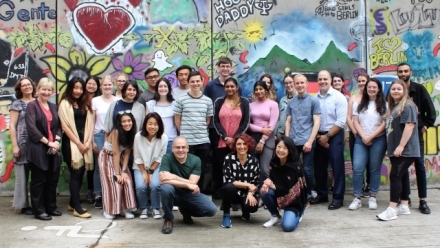Berlin Summer School: European Migration, Culture and Citizenship

OVERVIEW OF SUMMER SCHOOL
This intensive Summer School brought undergraduates to Berlin to learn about European immigration and integration challenges. Study topics included: Islam in Europe; multiculturalism; relationship between culture and citizenship; memorialisation versus community-based memory-making; refugee documentary; political change. The academic focus was enhanced by opportunities to engage with the first-hand experiences of European migrants, curators of cultural institutions, NGOs, and government officials.
Taught over six days by academic faculty from The Australian National University and Indiana University, the Summer School drew on academic expertise from German universities and cultural institutions. Application to the course was competitive and limited to 25 students from these participating universities:
- Indiana University, Bloomington
- The Australian National University
- The University of Canterbury
- The Royal Melbourne Institute of Technology
- The National University of Singapore
- Nanyang Technological University
- Victoria University of Wellington
This Summer School was jointly run by the above universities as part of the Jean Monnet PPCEUMI network and was taught in English.
PROGRAM BREAKDOWN
Sunday 7 July - arrival and orientation
Monday 8 July
The first day involved a morning session of discussions and lectures from academics. This was followed by an afternoon study tour that included a lunch talk at Refugio Cafe, a visit to former refugee camp at Tempelhof, Brandenburg gate, and a monument for executed Jews of Europe.
Tuesday 9 July
Day two began with a presentation on migration flows within Europe by Brett Bowles from Indiana University, followed by a panel discussion with Christian Bilfiger from Konrad-Adenauer-Stiftung, Kasia Williams and Anne McNaughton from The Australian National University and Camilla Ioli from University of Oxford. Students then went to FHXB Friedrichshain-Kreuzberg Museum for a lecture by Kasia Williams followed by a tour and site research. Students learned about the fascinating history of one of the most culturally diverse neighbourhoods in Berlin. Program participants were very impressed by and grateful to those at the museum for its amazing work. The day ended with dinner at a restaurant that provides work and training for refugees and students had the opportunity to learn about their different journeys to Germany.
Wednesday 10 July
Day three started with Abdulkadeer Sinno's thought provoking and challenging lecture on Islam in Europe. Students then visited the beautiful Sehitlik Mosque in Kreuzberg, where they had the opportunity to to meet the imam and learn about the history of the mosque and the history of Turkish German community. In the afternoon students took part in a workshop on documentaries about migration led by Susanna Scarparo The Australian National University, followed by a fantastic lecture by Anja Schwarz from Hochschulsport Universität Potsdam about citizenship and community engagement in German museum culture.
Thursday 11 July
The day began with the second part of student analysis of documentaries as cultural representation. This session was led by Susanna Scarparo from the The Australian National University. This session was followed by a robust discussion about how these representations impact upon migration policies. Students finished the day preparing their group presentations.
Friday 12 July
The final day started with a review of the key issues covered in the program, leading to the creation of a 'mud map' to distill six days of dialogue and learning. The highlight of the day was the students' group presentations. Students presented their responses to different aspects of the program: memory studies; museology; Syrian refugees in Germany; integration strategies; the role of choice (or lack thereof) in migration journeys; Tempelhof as the site of mobility; refuge and containment. The presentations were thoughtful and insightful and exemplified the multi and interdisciplinary approaches to complex and challenging issues.
Saturday 13 July – departure
Resources:
- Summer School flyer
- Pre-departure guide
- Reading pack - available to the participants only












